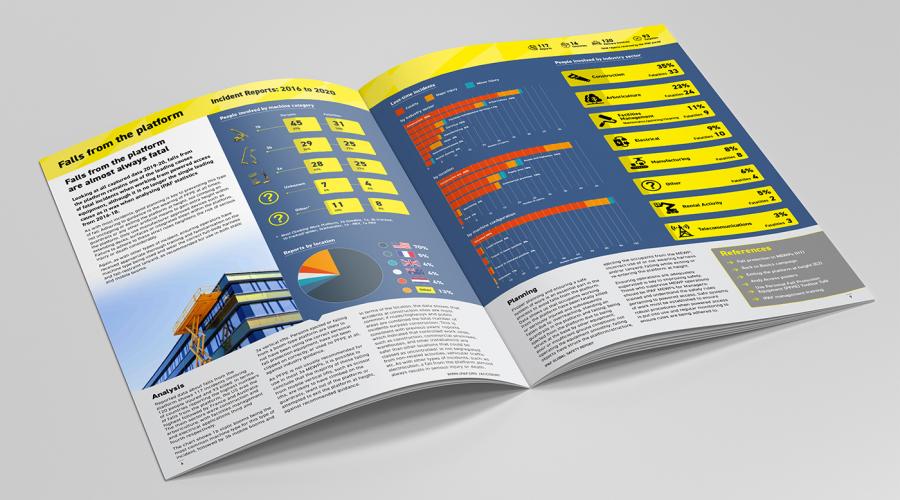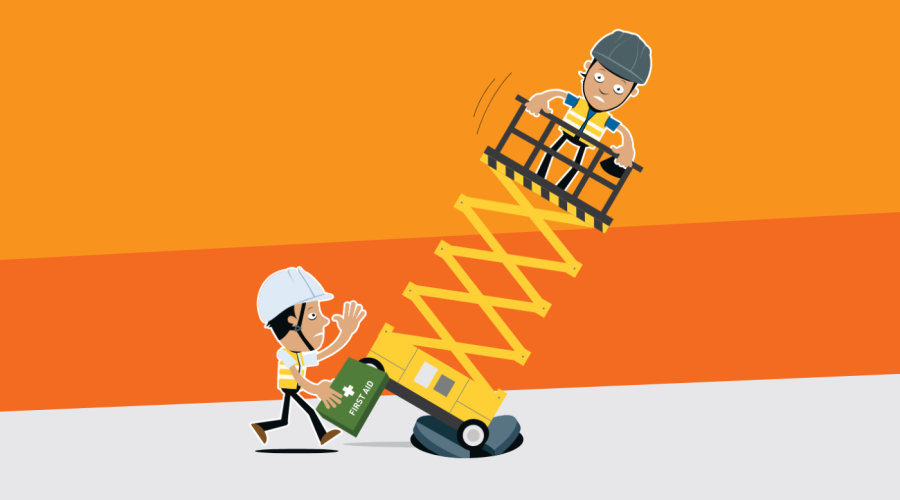IPAF Global Safety Report highlights need for near-miss data

The IPAF Global Safety Report 2021 analyses the main causes of serious injuries and fatalities occurring when using powered access machines to conduct temporary work at height, highlighting the need to gather more near-miss data from across the industry worldwide to help avoid the most common types of serious accident in future.
While the report, based on incidents logged in IPAF’s Accident Reporting Portal (www.ipafaccidentreporting.org), indicates the main causes of serious injuries and deaths while using powered have not changed significantly across the most recent two years of data, electrocutions have increased slightly to become the joint most common cause along with falls from the platform.
Over the whole five-year period 2016-2020, the most common causes of fatal incidents were falls from the platform and electrocutions, both accounting for 23% of deaths, followed by entrapments (19%), MEWP overturns/tip-overs (12%), MEWPs being struck by another machine or vehicle (6%) or hit by falling object(s) (5%).
In the early days of the accident reporting project, which launched in 2012-13, the majority of reports were received from IPAF’s UK membership. As the project enters its second decade, reports are now coming in from around the world, with reports received from 19 countries across the most recent two years of data gathering, and more than 25 countries worldwide in the past five years.
This year the report has been presented a different way than it was previously, with an executive summary giving a global overview, followed by detailed data spreads looking at each of the six main accident types broken down by location, machine type, industry sector, including lost-time-incident analysis specific to each incident classification.
Brian Parker, IPAF’s Head of Safety & Technical, says: “This new format will make the report easier to digest and understand, especially for members of the powered access rental industry and health & safety representatives at IPAF member companies, as well as end-use contractors of powered access.
“It may be statistically interesting to compare the number of accidents occurring around the world and between industry sectors, but it is more relevant and informative to be able to take a detailed look at electrocutions and falls from the platform, for example, to see what machine type, configuration, location or industry sector these are occurring in, to consider what some of the underlying factors may be and to plan ahead accordingly.
“This new approach allows us to present some key recommendations to factor in when planning powered access use, linked to specific references – be those technical guidance information, the free IPAF Andy Access safety posters and Toolbox Talk series, or relevant training courses that operatives are managers are advised to undertake to mitigate the specific risks identified leading to certain types of accident.
“The improved reporting portal, launched last autumn and now available in all main IPAF languages, has helped drive up reporting from more countries around the world and gather data from a wider range of industry sectors. This enables deeper analysis to inform all of the work IPAF does to improve safety, technical guidance and training.
“I’d particularly like to thank all of the IPAF Accident Work Group – Chair Mark Keily, James Clare, Alana Paterson and Chris Wraith – for their help in driving engagement and helping understand and interpret the data gathered through the portal; without them producing this comprehensive report would simply not have been possible.
“One thing that we all agree on is we must now focus on areas we know we need more data from; this means gathering more information about near misses – we are getting comprehensive reporting of serious injuries and deaths but need more reports of the seemingly innocuous mistakes that might have led to a serious outcome but didn’t.
“Near misses are important in understanding trends and preventing serious accidents in future. We hope that direct access to the reporting portal from the newly launched IPAF ePAL mobile app for operators and supervisors will empower more people to record these sorts of incident – quickly, easily and anonymously if so preferred.
“Likewise, we are getting some reports about Mast Climbing Work Platforms (MCWPs) and construction hoists, but our database is not quite complete enough regarding these machine types to draw meaningful statistical conclusions. We will work with our members and relevant technical committees to improve reporting from the MCWP sector to enable us to give useful insights into key accident trends in future.”
● Visit www.ipaf.org/accident to view or download the IPAF Global Safety Report 2021. To review the webinar hosted on 22 June to preview the launch of the 2021 report, see www.ipaf.org/webinars. Please use www.ipafaccidentreporting.org to report all accidents, incidents and near misses using powered access.
